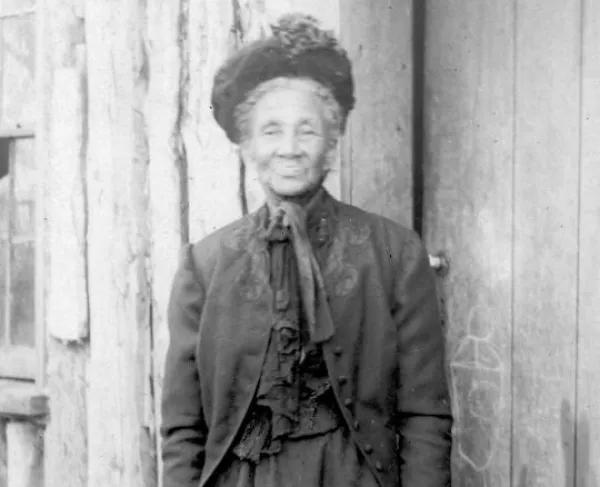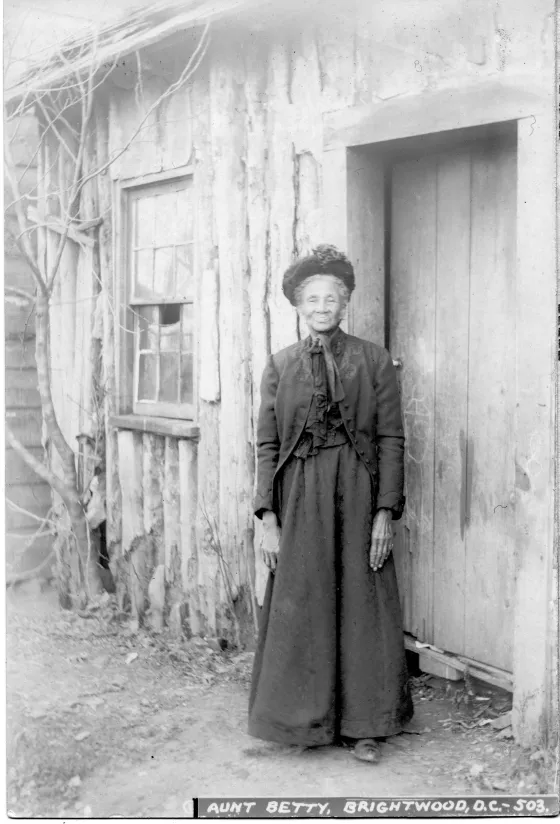Elizabeth Proctor Thomas

At the offset of the American Civil War, Elizabeth "Aunt Betty" Proctor Thomas worked on her family’s 88-acre farm with her siblings in Vinegar Hill, D.C., now known as Brookland. Her family settled on the highest elevation point in this neighborhood bordering Seventh Street Turnpike, now known as Georgia Ave. This location and elevation made the site desirable to the U.S. Army.
On July 21, 1861, the Union and Confederate soldiers fought the first major land battle of the Civil War near the banks of Bull Run near Manassas, Va. The Confederates won, and the Union army retreated to the Capital. Realizing that a long war had begun, the U.S. Army began to strengthen fortifications around Washington. In September, the U.S. Army forced Thomas off a section of her land, removed her furniture, and started dismantling her house and barn. She often recounted that day, and not only because she lost her home and most of her farm. She told newspapers that
"I was sitting under that sycamore tree . . . with what furniture I had left around me. I was crying, as was my six months-old child, . . . when a tall, slender man dressed in black came up and said to me, 'It is hard, but you shall reap a great reward.'”
That “tall, slender man” was Abraham Lincoln.
The fort built on her property was ultimately named Fort Stevens in honor of General Isaac I. Stevens, who was killed in the Battle of Chantilly in 1862. She lived adjacent to this fort for the entirety of the war. Nicknamed “Aunt Betty” by the soldiers stationed there, she cooked and cleaned in the fort and did not retreat, even when Confederate forces approached.
On July 11-12, 1864, Fort Stevens and the nearby Fort DeRussy were attacked. President Abraham Lincoln, First Lady Mary Todd Lincoln, and some of the presidential cabinet traveled to the Fort to watch the battle. President Lincoln was the second sitting president to be in line of fire while serving in office. Folklore holds that someone yelled at Lincoln “Get down you damn fool!” during the battle. Some sources say that future Chief Justice Oliver Wendell Holmes yelled that phrase. Other sources said that Thomas did as she brought ammunition to the troops.

After the war, Fort Stevens was decommissioned, and the site fell into disrepair. Thomas petitioned the government to compensate her for her destroyed house and forcible use of her land. This claim went through legal barriers until she received $1,835 dollars in compensation in 1916. The portions of land she still owned was passed down to her children and the land on which the fort stood was eventually purchased by the government and partially rebuilt by the Civilian Conservation Corps in 1938.
Thomas became a community leader and activist in Vinegar Hill. While the financial “great reward” she was supposed to receive didn’t materialize until the end of her life, she was able to get the honorary recognition that her land was used to build Fort Stevens. In addition, she was able to join the veterans of the Battle of Fort Stevens in 1911 when they dedicated a monument to President Lincoln. Elizabeth Proctor Thomas died in 1917.





